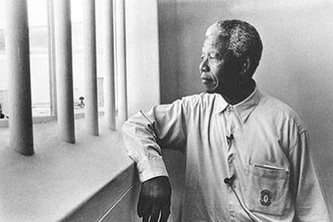 Forgiveness is hard work, requires a steely commitment to make reconciliation happen at the deepest and realistic levels, and filters down from a leader to the people. Sports and cheering for a team are capable of reconciling enemies and those deeply suspicious of one another.
Forgiveness is hard work, requires a steely commitment to make reconciliation happen at the deepest and realistic levels, and filters down from a leader to the people. Sports and cheering for a team are capable of reconciling enemies and those deeply suspicious of one another.
Such are the themes that emerged over and over in the movie
Invictus. Morgan Freeman played Nelson Mandela well — though no one can capture the man completely or perhaps even well. That early scene with his daughter made Mandela’s approach come to life: nonviolent, seek reconciliation, think nation, don’t seek vindication, and work together and we can be a reconciled nation. Mandela clearly saw the potential of sports. But the movie is a sports movie, the story of South Africa’s win in the 1995 rugby championship. The movie’s not Mandela’s biography, which we need — and I hope the South Africans do it.
That Kris and I have been to South Africa, and that we saw places we’ve seen — like Robben Island and Table Mountain and the coast of Cape Town — gave the movie special meaning, and I thought Matt Damion had a credible South African (Afrikaaner) English accent. The first time we were in Stellenbosch, the Theo Geyser’s favorite Rugby team was playing in a rain storm and he and I and Kris sat at a fine little restaurant in Stellenbosch, watched and sipped fine wine and had a wonderful evening. Rugby matters to the South African.
The poem, Invictus, was a leitmotif but I didn’t find it mentioned in Mandela’s autobiography’s index — perhaps a Hollywood poem imposed on Mandela:
Invictus
Out of the night that covers me,
Black as the Pit from pole to pole,
I thank whatever gods may be
For my unconquerable soul.
In the fell clutch of circumstance
I have not winced nor cried aloud.
Under the bludgeonings of chance
My head is bloody, but unbowed.
Beyond this place of wrath and tears
Looms but the Horror of the shade,
And yet the menace of the years
Finds, and shall find, me unafraid.
It matters not how strait the gate,
How charged with punishments the scroll.
I am the master of my fate:
I am the captain of my soul.
William Ernest Henley
 Forgiveness is hard work, requires a steely commitment to make reconciliation happen at the deepest and realistic levels, and filters down from a leader to the people. Sports and cheering for a team are capable of reconciling enemies and those deeply suspicious of one another.
Forgiveness is hard work, requires a steely commitment to make reconciliation happen at the deepest and realistic levels, and filters down from a leader to the people. Sports and cheering for a team are capable of reconciling enemies and those deeply suspicious of one another. 